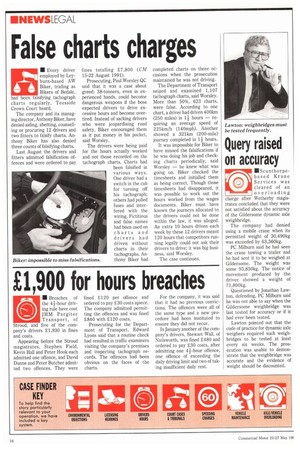False charts charges
Page 18

If you've noticed an error in this article please click here to report it so we can fix it.
• Every driver employed by Leyburn-based AW Biker, trading as Bikers of Bedale, had seen alsifying tachograph charts regularly, Teesside Crown Court heard.
The company and its managing director, Anthony Biker, have denied aiding, abetting, counselling or procuring 12 drivers and two fitters to falsify charts. Anthony Biker has also denied three counts of falsifying charts.
Last August the drivers and fitters admitted falsification offences and were ordered to pay
fines totalling £7,800 (CM 15-22 August 1991).
Prosecuting, Paul Worsley QC said that it was a case about greed: 38-tonners, even in experienced hands, could become dangerous weapons if the boss expected drivers to drive excessive hours and become overtired. Instead of sacking drivers who were jeopardising road safety, Biker encouraged them as it put money in his pocket, said Worsley.
The drivers were being paid for the hours actually worked and not those recorded on the tachograph charts. Charts had been falsified in various ways. One driver had a switch in the cab for turning off his tachograph; others had pulled fuses and interfered with the wiring. Fictitious and false names had been used on charts and drivers had driven without charts in their tachographs. Anthony Biker had completed charts on three occasions when the prosecution maintained he was not driving.
The Department of Transport seized and examined 1,107 tachograph charts, said Worsley. More than 50%, 623 charts, were false. According to one chart, a driver had driven 400km (250 miles) in 11 hours — requiring an average speed of 225km/h (140mph). Another showed a 321km (200-mile) journey completed in 11 hours.
It was impossible for Biker to have missed the falsifications if he was doing his job and checking charts periodically, said Worsley — he knew what was going on. Biker checked the timesheets and initialled them as being correct. Though those timesheets had disappeared, it was possible to work out the hours worked from the wages documents. Biker must have known the journeys allocated to the drivers could not be done within the law, it was alleged. An extra 10 hours driven each week by these 12 drivers meant 120 hours that competitors running legally could not ask their drivers to drive; it was big business, said Worsley.
The case continues.




























































































